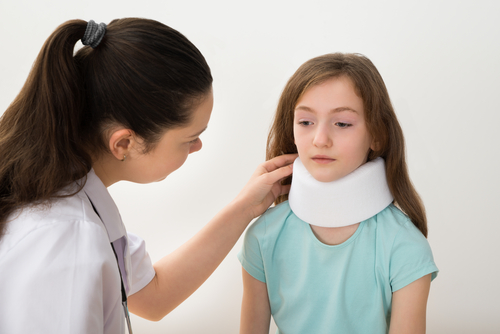
Information for Parents
Minor injuries to the neck often happen, especially after road traffic collisions or sporting incidents. This is often known as ‘whiplash’.
A neck sprain can cause pain in the muscles of the neck and/or shoulders. Sometimes this pain can happen straight after the accident and sometimes it can develop after a few hours.
Neck pain can develop spontaneously overnight as well- this is called Torticollis or ‘wry’ neck.
Muscular pain usually becomes worse over the first 24-36 hours, and then gradually gets better over 1-2 weeks.
Torticollis
Torticollis means ‘twisted neck’. This is a common cause of neck pain and stiffness in children and young people. It usually goes away on its own over a few days, sometimes longer. Painkillers may ease the pain. Gentle neck exercises are usually advised.
The cause of acute torticollis is often not known. It can happen in people with no previous neck symptoms and there is usually no obvious injury. However, it may be due to a minor sprain or irritation of a muscle or a ligament in the neck.
It is common for people to go to bed feeling fine and to wake up the next morning with acute torticollis.
The pain is usually on one side of the neck and stiffness of the muscles in that area twists the neck to one side. Attempts to straighten the neck are difficult due to pain. The pain may spread to the back of the head or the shoulder. The muscles of the affected side may be tender.
Pressure on certain areas may trigger a ‘spasm’ of the muscle. Movement of the neck is restricted, particularly on one side.
Treatment Neck Sprain or Torticollis
The aims of treatment are to relieve the pain and try to reduce the stiffness in the muscles.
Exercises are vital to increase movement in the neck and help reduce pain
Further Information
If you need any more information or advice between the hours of 0800-2000 Monday-Sunday please call The Children’s Urgent Care Centre on 02073906150.
Out of hours please contact NHS 111.
Call NHS 111 if you need medical help fast, but its not life threatening- for example, if you:
In case of emergency please call 999 or attend your local Children’s Emergency Department.